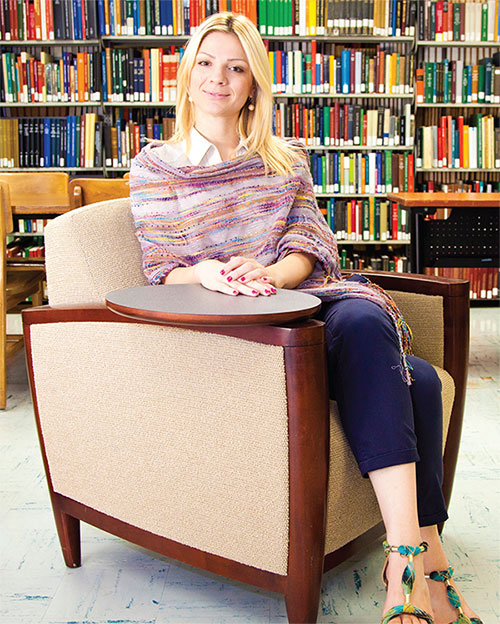International Influence

Nine idyllic land and seascapes spaced evenly above Josipa Basic’s desk serve as reminders of home for the Croatian Ph.D. student. Colorful postcards from all over the world as well as a children’s wide-eyed owl painting have found a home on the bulletin board close by.
Creating a home away from home is a theme mirrored throughout the Information Experience Laboratory. Basic’s peers, some of whom are also international students, share her experience of living far away from home and family.
“This is where we live,” Basic, 26, says. “This is our home, our house. We give each other support.”
Numbers on the rise
The Information Experience Laboratory, where Basic spends much of her time, is a University of Missouri-operated usability laboratory where computer software, applications and websites are evaluated and tested for their usability.
Basic joined MU in 2010 to begin work on her Ph.D. in information science and learning technology. Before arriving in Columbia, she earned her bachelor’s degree in library and information science and her master’s in written heritage in digital environment from the University of Zadar, Croatia.
Although the majority of international students at MU are, such as Basic, seeking graduate and professional degrees, enrollment trends for the university show that the number of international students seeking their undergraduate degrees has increased since fall 2008, according to the International Center at MU.
Preliminary data from spring 2011 suggests undergraduate international students at MU would reach 28 percent in the fall of that year. The percentage of graduate and professional degree-seeking students might experience a 4 percent decline.
Despite changes in the percentage of students seeking graduate and professional-level degrees versus undergraduate degrees, the overall enrollment of international students has increased steadily from 1,488 students in spring 2003 to 1,948 students in fall 2010, according to the International Center at MU.
Cross-cultural experience
 While international enrollment swelled in 2010, Basic joined MU to begin working toward her Ph.D. Although far from home, Basic has incorporated the lessons she learned as a child in Croatia into her life and research at MU.
While international enrollment swelled in 2010, Basic joined MU to begin working toward her Ph.D. Although far from home, Basic has incorporated the lessons she learned as a child in Croatia into her life and research at MU.
Although at ease in the laboratory where she works as a research assistant, Basic says it took about six months to adjust to life in Columbia when she arrived two years ago.
“Everything was different,” she says. “The cars are different, the air is thicker and hard to breath, and the way people interact is different.”
Despite living amidst the Domovinski rat, a word that means “war for our homeland” in Croatian, Basic says her father, Mladen, and mother, Stana, taught her to love and respect others. The Domovinski rat, known as the Yugoslav Wars in America, began in 1991 when Basic was just 5 years old.
“I remember hearing the bombs and being in the basement most of the time, designing clothes for my dolls,” Basic says.
Although Basic’s memories during the Domovinski rat are limited, the war caused her to grow more attached to her family and gave her a strong respect for diversity.
“My parents never told me to hate anyone,” she says. “It’s not people but politics that caused the war.”
The respect for life Basic gained as a child developed into a passion to help others, as the subject of her research at MU reflects. In the course of earning her Ph.D., Basic hopes to combine her knowledge in information science, special education and computer science to study how people, especially children, with disabilities learn while using technology.
Foreign investment
The time Basic and her international peers spend studying in Columbia translates into financial boosts for state revenues, as money for tuition and the cost of living are funneled into local economies.
Basic said her classes at MU cost around $8,000 per semester, and her living expenses reach about $600 per month in Columbia, though she is uncertain if these figures are exact (her University of Zadar, Croatia picks up the tab).
International students enriched Missouri’s economy by $383.3 million in fall 2010, according to NAFSA: Association of International Educators, an organization founded in 1948 as the National Association of Foreign Student Advisers to advance international education.
The number of international students studying in the United States sported a 5 percent increase in fall 2010, according to the Open Doors Report. In the same year, the visiting students brought approximately $20.23 billion to the United States, according to NAFSA.
Technology and humanity
Aside from economic gains made by host countries, studying internationally can enrich a person’s life, Basic says. “Everyone should do it. Getting out of my bubble and experiencing new cultures has helped me develop as a person.”
Basic’s work at the Information Experience Laboratory has taught her a great deal about what makes “good technology,” she says, and she hopes to use the experience she’s gained there in her own research.
It is Basic’s contention that people with disabilities such as attention deficit disorder encounter unexpected information differently from their peers. She says she would like to understand how people with disabilities experience information in online environments and hopes to design technology that will help bridge this gap.
“I would feel fulfilled if I know I can help,” Basic says. “It doesn’t matter where I live.” Basic is on track to finish her doctoral program in 2014; after that, she is prepared to go wherever she and her multifaceted education are needed.


